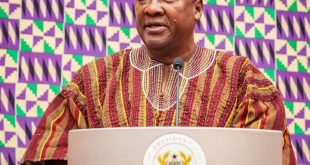Dr. Mahamudu Bawumia, vice president, has stated that the ongoing global economic crisis must serve as a wake-up call for African nations to embrace a technological approach to development, particularly as the continent looks to rebuild and grow.
The Veep warned against focusing on the short-term symptoms of the current crisis and ignoring the structural issues that the worst-hit countries are confronted with, which are primarily related to their economies’ lack of competitiveness, while speaking at a high-level African Union-backed “BOMA” event (www.africaboma.com).
A problem that can only be effectively solved through technological innovation. The Boma forum brought together global political and business leaders to deliberate on the progress of Africa towards Agenda 2063, the AU’s timetable for transforming Africa into a global economic force.
The COVID-19 Pandemic and the conflict in Ukraine, according to Vice President Bawumia, have exposed gaps in the world’s economic and political architecture. If Africa does not take decisive action to create technological industries that are more resilient to global economic shocks, this will affect Africa’s quest for growth.
It is evident that nations whose economies are heavily reliant on primary industries suffer more severe repercussions when the global economy tankes than do nations with more technologically advanced economies.
“The challenges that have beset the global economy may have been fuelled by temporary crises such as the COVID-19 pandemic and the Ukraine conflict. But these challenges are still a wakeup call to Africa that there are deep structural gaps in the global economic and political architecture that can frustrate its rise, unless serious concerted efforts are made to plug them,” Dr. Bawumia told the forum on Friday.
The only way to close the structural gap, according to Dr. Bawumia, is for the African continent to adopt the cutting-edge data-driven, technological methods to development. This would help construct the proper framework for African enterprises and SMEs and connect them to the global economy.
Dr. Bawumia urged other African nations to pursue economic development by pointing out that Ghana has decided to do so by using more technical, particularly digital, content in its development plans.
Responding to Meta’s (corporate parent of Facebook) President for Global Affairs and former Deputy Prime Minister of the United Kingdom, Sir Nick Clegg, Dr. Bawumia conceded to certain ongoing challenges to optimally harness data, talent and improved regulations to advance the course of technological advancement in Ghana and Africa. But he insisted that these matters are being given the necessary attention. Elaborating on the theme, he added, “if the massive shifts currently underway, such as the fast emergence of a new type of internet, are to benefit, rather than further marginalize Africa, the continent must make the right investments now.”
He continued: “we are very mindful of these potential pitfalls and are investing in both the institutions and infrastructure that will enable us to both leapfrog our infrastructure and education system limits and rapidly advance the regulatory capabilities we need to deal with complex challenges like balancing sovereignty and efficiency, as we become a data-driven economy.”
Dr. Bawumia highlighted with the event some specific areas Ghana has invested in and how they are projected to increase trade, while also noting the efforts several African nations are making to adopt technology-driven growth.
“We have successfully developed new identity infrastructure that will transform credit scoring for SMEs, remove the bottlenecks in e-commerce and lay the ground for the modernization of business supportive government services,” he said.
“We have totally transformed the financial technology landscape and reworked our mobile telecom industry to enable us take advantage of the 5G revolution and the internet of things as they gather pace.”
“No one who has followed our policy journey in Ghana can doubt our total commitment to the technological approach to development,” added the Vice President.
Former US President Bill Clinton, former US Secretary of State Hillary Clinton, as well as many other dignitaries, including the Director General of the World Health Organization and the Deputy Secretary General of the United Nations, spoke at the Forum in addition to Sir Nicholas Clerg, who serves as the President of Global Affairs of Meta, the company that owns the well-known social media platforms Facebook and Instagram.
The Deputy Chairperson of the African Union (AU), several previous and current African Heads of State, and several AU Commissioners also took part.
Reacting to comments by some of these eminent personalities, Dr. Bawumia emphasised the importance of a global mindset shift in technology investments. “The likes of Meta, Google and Amazon must think beyond consumer products and targeted advertising and invest heavily in utility infrastructure on the ground.”
He added, “their ability to connect with their customers beyond Facebook posts and tweets and to impact their lives depend on this deeper integration into industrial and enterprise infrastructure. There are also broader issues of equity.”
“As much as we recognize that some of the evolving technologies are changing how we do business and bringing down barriers, they also provide the opportunity for us to create the fluid structures and soft infrastructure our SMEs and startups, long isolated from global value chains, need to leapfrog and convert these challenges into opportunities in a broader marketplace shaped by AfCFTA.”
Source: Ghanatodayonline.com
 Ghanatodayonline.com News, Politics, Health, Education & More
Ghanatodayonline.com News, Politics, Health, Education & More




